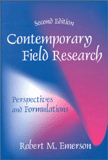“A needed and useful book. Very helpful for advanced undergraduates and for graduate students.” — Ross Koppel, University of Pennsylvania
“An excellent text that covers a breadth of core themes on ethnographic research. Highly recommended.” — Robert Silverman, Wayne State University
“This is a great book on the different aspects of qualitative research. The introduction sets the history of the field method in context. The other readings are insightful and accessible to students.” — Enrique Puma, William Paterson University
“A great blend of philosophy of science and practical research issues. I have adopted it for my research design course.” — Louis Goodman, American University

433 pages, $49.95 list
1-57766-185-0
978-1-57766-185-6
© 2001
paperback
Similar Titles
Contemporary Field Research
Perspectives and Formulations
Second Edition
As ethnography enters the twenty-first century, it has been transformed from a method of research standing on the edges of mainstream social science theory and research. Ethnography now attracts widespread interest, not only from anthropology and sociology but also from many other genres. The four distinctive idioms of qualitative inquiry—naturalism, ethnomethodology, emotionalism, and postmodernism—each use field research to pursue different questions and concerns, posit different versions of “the field,” and specify different methods as appropriate for doing so.
Emerson provides comprehensive reviews of core issues, reflecting the increased acceptance of and growing divergences among current ethnographic approaches. In addition, he addresses concerns central both to earlier periods of field research, particularly those marking the beginnings of the reflexive turn, and to those raised by contemporary, more radically representational and postmodern approaches to ethnography.
Emerson provides comprehensive reviews of core issues, reflecting the increased acceptance of and growing divergences among current ethnographic approaches. In addition, he addresses concerns central both to earlier periods of field research, particularly those marking the beginnings of the reflexive turn, and to those raised by contemporary, more radically representational and postmodern approaches to ethnography.
Reactions
Introduction: The Development of Ethnographic Field Research
Part I. THE FACE OF CONTEMPORARY ETHNOGRAPHY
1. Thick Description: Toward an Interpretive Theory of Culture (Clifford Geertz)
2. Telling the Convict Code (D. Lawrence Wieder)
3. Ethnography and the Representation of Reality (Paul Atkinson)
4. Ethnography and Realism (Martyn Hammersley)
Part II. FIELDWORK PRACTICE: Issues in Participant Observation
5. On Fieldwork (Erving Goffman)
6. Inside Field Research in Minority Communities (Maxine Baca Zinn)
7. On the Evolution of Sidewalk (Mitchell Duneier)
8. How the Problem of “Crafting Selves” Emerged (Dorrine K. Kondo)
9. Gender and Fieldwork Relations (Carol A. B. Warren)
10. Learning from Kids (Barrie Thorne)
11. Constructing Participant/Observation Relations (Robert M. Emerson and Melvin Pollner)
12. Trial and Tribulations: Courts, Ethnography, and the Need for an Evidentiary Privilege for Academic Researchers (Richard A. Leo)
Part III. PRODUCING ETHNOGRAPHIES: Theory, Evidence and Representation
13. The Epistemology of Qualitative Research (Howard S. Becker)
14. Analytic Induction Revisited (Jack Katz)
15. Grounded Theory (Kathy Charmaz)
16. Tricks of the Trade (Howard S. Becker)
17. Ethnography’s Warrants (Jack Katz)
18. Techniques of Validation in Qualitative Research: A Critical Commentary (Michael Bloor)
Part I. THE FACE OF CONTEMPORARY ETHNOGRAPHY
1. Thick Description: Toward an Interpretive Theory of Culture (Clifford Geertz)
2. Telling the Convict Code (D. Lawrence Wieder)
3. Ethnography and the Representation of Reality (Paul Atkinson)
4. Ethnography and Realism (Martyn Hammersley)
Part II. FIELDWORK PRACTICE: Issues in Participant Observation
5. On Fieldwork (Erving Goffman)
6. Inside Field Research in Minority Communities (Maxine Baca Zinn)
7. On the Evolution of Sidewalk (Mitchell Duneier)
8. How the Problem of “Crafting Selves” Emerged (Dorrine K. Kondo)
9. Gender and Fieldwork Relations (Carol A. B. Warren)
10. Learning from Kids (Barrie Thorne)
11. Constructing Participant/Observation Relations (Robert M. Emerson and Melvin Pollner)
12. Trial and Tribulations: Courts, Ethnography, and the Need for an Evidentiary Privilege for Academic Researchers (Richard A. Leo)
Part III. PRODUCING ETHNOGRAPHIES: Theory, Evidence and Representation
13. The Epistemology of Qualitative Research (Howard S. Becker)
14. Analytic Induction Revisited (Jack Katz)
15. Grounded Theory (Kathy Charmaz)
16. Tricks of the Trade (Howard S. Becker)
17. Ethnography’s Warrants (Jack Katz)
18. Techniques of Validation in Qualitative Research: A Critical Commentary (Michael Bloor)